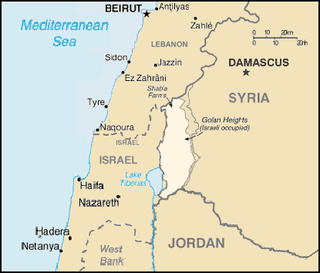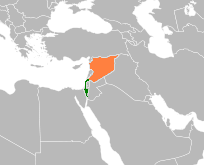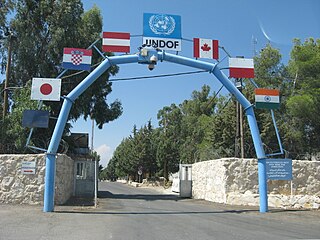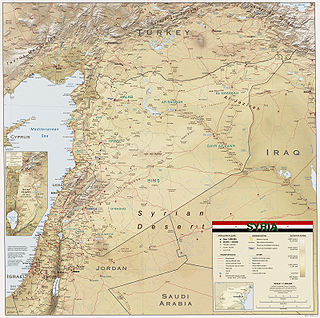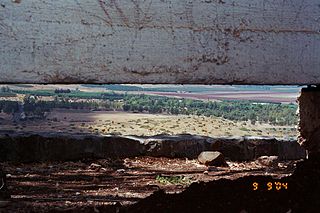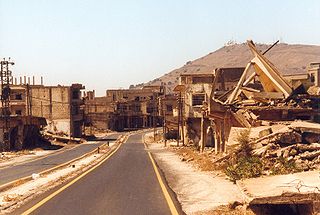| UN Security Council Resolution 1648 | |
|---|---|
 Israel (blue) and Syria (red) | |
| Date | 21 December 2005 |
| Meeting no. | 5,339 |
| Code | S/RES/1648 (Document) |
| Subject | The situation in the Middle East |
Voting summary | 15 voted for None voted against None abstained |
| Result | Adopted |
| Security Council composition | |
Permanent members | |
Non-permanent members | |
United Nations Security Council Resolution 1648, adopted unanimously on 21 December 2005, after considering a report by the Secretary-General Kofi Annan regarding the United Nations Disengagement Observer Force (UNDOF), the Council extended its mandate for a further six months until 30 June 2006. [1]
A United Nations Security Council resolution is a UN resolution adopted by the fifteen members of the Security Council; the UN body charged with "primary responsibility for the maintenance of international peace and security".
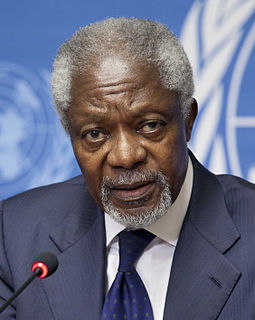
Kofi Atta Annan was a Ghanaian diplomat who served as the seventh Secretary-General of the United Nations from January 1997 to December 2006. Annan and the UN were the co-recipients of the 2001 Nobel Peace Prize. He was the founder and chairman of the Kofi Annan Foundation, as well as chairman of The Elders, an international organization founded by Nelson Mandela.

The United Nations Disengagement Observer Force (UNDOF) was established by United Nations Security Council Resolution 350 on 31 May 1974, to implement Resolution 338 (1973) which called for an immediate ceasefire and implementation of United Nations Security Council Resolution 242.
Contents
The resolution called upon the parties concerned to immediately implement Resolution 338 (1973) and requested that the Secretary-General submit a report on the situation at the end of that period.

The three-line United Nations Security Council Resolution 338, adopted on October 22, 1973, called for a ceasefire in the Yom Kippur War in accordance with a joint proposal by the United States and the Soviet Union. The resolution stipulated a cease fire to take effect within 12 hours of the adoption of the resolution. The "appropriate auspices" was interpreted to mean American or Soviet rather than UN auspices. This third clause helped to establish the framework for the Geneva Conference (1973) held in December 1973.
The Secretary-General's report pursuant to the previous resolution on UNDOF said that the situation between Israel and Syria had remained generally quiet, though the situation in the Middle East as a whole remained tense until a settlement could be reached. [2]

Israel, also known as the State of Israel, is a country in Western Asia, located on the southeastern shore of the Mediterranean Sea and the northern shore of the Red Sea. It has land borders with Lebanon to the north, Syria to the northeast, Jordan on the east, the Palestinian territories of the West Bank and Gaza Strip to the east and west, respectively, and Egypt to the southwest. The country contains geographically diverse features within its relatively small area. Israel's economic and technological center is Tel Aviv, while its seat of government and proclaimed capital is Jerusalem, although the state's sovereignty over Jerusalem has only partial recognition.

Syria, officially the Syrian Arab Republic, is a country in Western Asia, bordering Lebanon to the southwest, the Mediterranean Sea to the west, Turkey to the north, Iraq to the east, Jordan to the south, and Israel to the southwest. A country of fertile plains, high mountains, and deserts, Syria is home to diverse ethnic and religious groups, including Syrian Arabs, Greeks, Armenians, Assyrians, Kurds, Circassians, Mandeans and Turkemens. Religious groups include Sunnis, Christians, Alawites, Druze, Isma'ilis, Mandeans, Shiites, Salafis, Yazidis, and Jews. Sunnis make up the largest religious group in Syria.
The Council also welcomed efforts by UNDOF to implement the zero-tolerance sexual exploitation policy.
Sexual exploitation and abuse in humanitarian response first came to public attention with the release of a report in February 2002 of a joint assessment mission examining the issue. The joint mission reported that "refugee children in Guinea, Liberia and Sierra Leone have been subjected to sexual abuse and exploitation, reportedly by employees of national and international NGOs, UNHCR and other UN bodies..." Humanitarian agencies responded almost immediately with measures designed to prevent further abuse, setting up an inter-agency task force with the objective of "strengthening and enhancing the protection and care of women and children in situations of humanitarian crisis and conflict..." In 2008 there were signs that sexual exploitation and abuse of beneficiaries not only continued, but was under-reported. In January 2010, the ECHA/ECPS task force developed a website devoted to protection from sexual exploitation and abuse (PSEA) by personnel of the United Nations (UN), non-governmental organizations (NGOs) and other international organizations.

